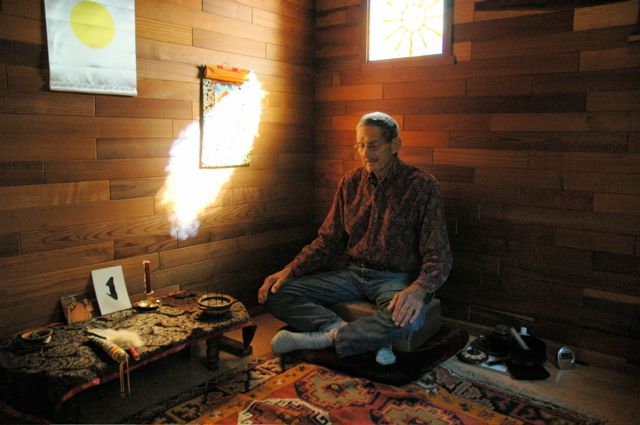
CARPENTRY IS MEDITATION
I once worked in the 1950s with a framing carpenter, Paul, who taught me a real-life lesson. We were partners working as piece workers cutting rafters, building, and sheathing roofs. In warm So. Calif. we started work at 7 a.m. Around 10:00 in the morning, Paul would finally wake up. Until then he was dangerous to be around–“unsafe at any speed.” Simply put, he was there with his body, but his mind was elsewhere. Twice he dropped a rafter on my right foot breaking one of my toes each time. To protect myself, I used to swing a long 2×4 around early on in the day and try to whack him in the shins to wake him up. It was a case of either him or me. Finally, one morning it happened. We were sheathing a roof and he, with his mind elsewhere, cut a huge gash in his forearm with a circular saw. This time it was him not me. The muscle was gaping open spurting blood. I ripped a piece of cloth from my shirt, put a tourniquet on his arm, got him down from the roof, and drove him to an emergency room. That was the last time I saw Paul. I heard later that he joined the Fire Department. I wished them well.
Mindfulness = safety
Being on a construction site, or even in a shop, is often dangerous. As framers, we work around small overhead cranes carrying heavy loads, forklifts, and all kinds of power equipment like saws, routers, and pneumatic nail guns. In order to avoid getting injured, carpenters need to be mentally present all day long—mindful of what we are doing. The more we can be present, the safer the job will be for ourselves and fellow workers. I can say with assurance that every time I have been hurt at work it was because my mind was elsewhere.
Yes, more than once, I have been hurt on a job site and every time it happened my mind was elsewhere. It can happen like this—One day I was cutting rafter tails to length up on a two story apartment building. Someone called my name from across the building. Instead of being mindful of what I was doing and finishing the cut, I looked up, and the circular saw dropped into my shoe laying open a gash in my poor toe. The MD put a few stitches to seal off the cut, but I couldn’t get him to work on my slashed open boot.
I taught carpentry in a community college for years. A teaching partner, using a jointer and talking to students, forgot to lift his middle finger when finishing the cut on a piece of wood. Not a good finger to mess with. To this day he walks around with one less finger nail.
So that’s why I say that Carpentry IS Meditation. By meditation I mean being aware of what we are doing and where we are. Our mind is joined with our body in the present moment. We can spend our time wandering around our past lives or thinking about our future, but the present moment is really all we will ever have, no?
Everyone meditates
Meditation is a simple practice that all of us do every day as we go about our lives. We think about (meditate) on many aspects of our lives. Many of us work at training our body to be healthy and athletic. We can, if we wish, take it a step further and train our minds to be present and calm. Believe me, this can make a big difference in our job site safety and in our everyday lives with our partners, children, and friends.
These days meditation practice is being taught in centers all around our country. It is an ancient practice that is sometimes called mindfulness-awareness practice or mindfulness-stress-reduction practice. Even here on the Oregon coast, meditation practice is being used in our medical clinic to help patients heal by reducing stress. A stressed out body and mind doesn’t heal easily, right? Being stressed out on a job site is a recipe for injury.
Meditation is not a difficult practice and is especially useful in our hurried lives. We have all had moments of mindfulness that are filled with peace, stillness, and joy. Why not train to enjoy this more often?
Find a peacful place
We live on a slight hillside that had a disaster of a deck when we moved in. Below the deck was an area filled with the former owner’s junk. I find this to be one the joys to work as a carpenter. I can take tools and materials and create a new and beautiful place with my own hands. So what I saw was the possibility of building a couple of small, quiet rooms below as I rebuilt the deck.
One of the rooms is 7 ft. x 8 ft. that we use as a place to stretch out and as an extra bedroom when children come to visit. The other is 8 ft. x 9 ft. that I call a quiet, sacred room. Inside the quiet room I built a bookshelf and a place to sit and read. The walls and ceiling are finished with local western red cedar from a contractor who had it left over on a big custom house he built. On the laminate wood floor is a wool rug given to me by a woman I helped. She had no money for the job I did for her, so she insisted that I take the rug. This, along with some cushions to sit on, gives the entire place a feeling of elegance fit for an old carpenter like me.
So for the past twenty years, I have learned to sit on my cushion in this room and do nothing, paying attention to my breath, allowing my rattle-on mind to calm down and be present.
Long ago poet Rumi said: “Don’t go back to sleep.” I urge you to at least think about what I have written. We can train our minds to be here, right here, present at work, with family, bird sounds, and even with my wife’s dog who tolerates me at best.
Fine Homebuilding Recommended Products
Fine Homebuilding receives a commission for items purchased through links on this site, including Amazon Associates and other affiliate advertising programs.

Reliable Crimp Connectors

8067 All-Weather Flashing Tape

Affordable IR Camera
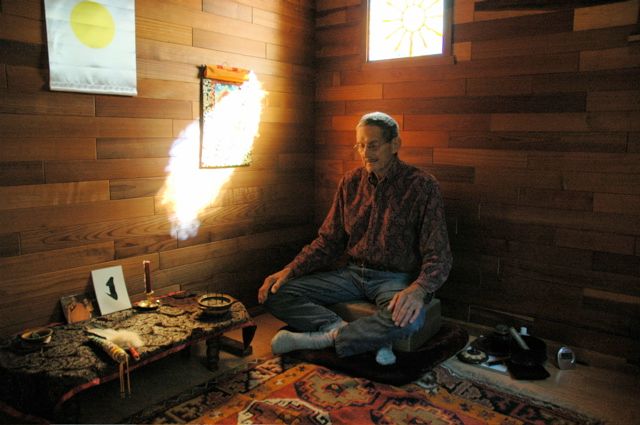
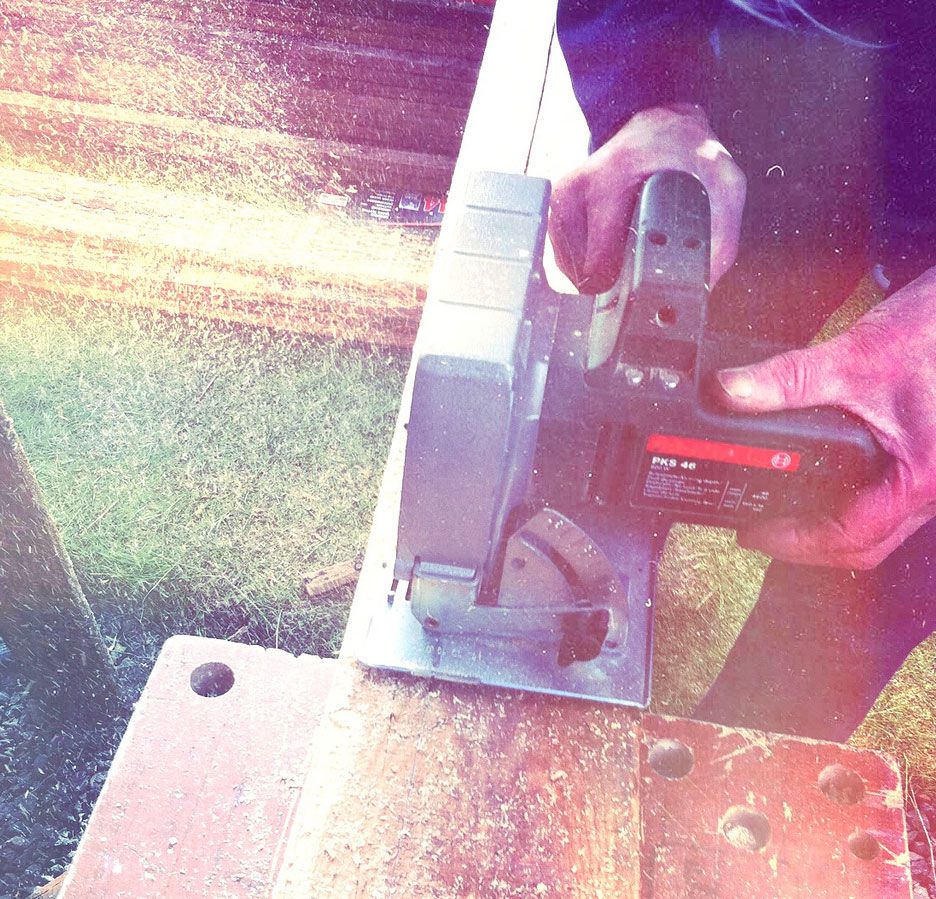
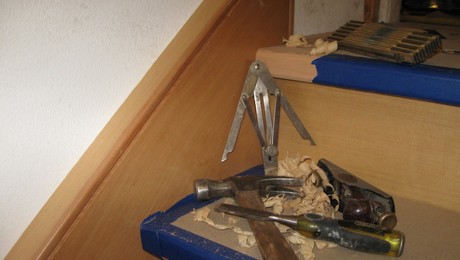
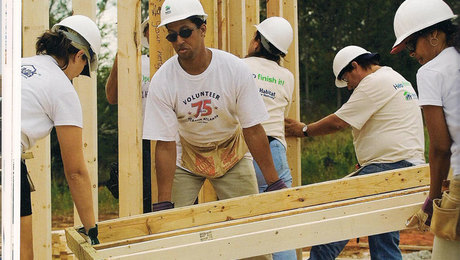
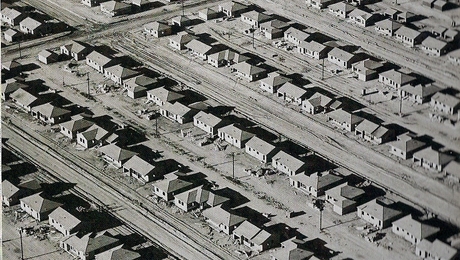



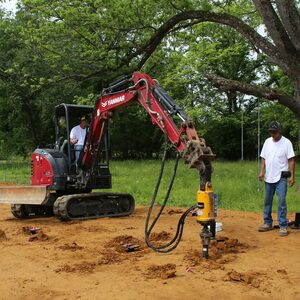
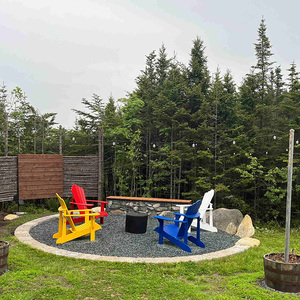
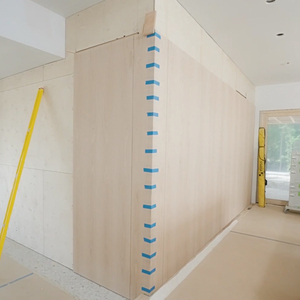
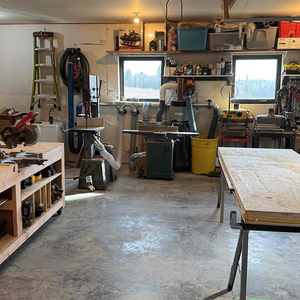

















View Comments
While I am not into eastern style practices, I do live a reasonably stress free life - all the while as a professional carpenter. Here's a few tips I try to live by:
1. Work Slower
Accidents happen when you don't give yourself (or your crew) enough time to think through what you are doing and how to do it in a safe yet efficient manner.
2. Charge More
Budgets are often tight making schedules tight making contractors stress out and try to move too fast - that causes accidents. While I realize you gotta compete to rope in clients, but you gotta afford to live too. Carpentry is a tough job and you should be paid well to do it. Stop lowball quoting, risk loosing some bids, choose jobs that focus on quality, and always provide exemplar craftsmanship.
3. Be Honest
Stop lying to clients and coworkers... even little lies. If you screw up the estimate or scratch their floor then just tell them and work it out. If you know you aren't going to make it to the job the next day, don't tell the client you'll be there. If you don't know what you are doing then say so. If you over charged for a job you thought would be difficult but ended up easy, offer a discount. Just don't let a bunch of lies, mistakes, exaggerations, and trickery weigh you down with stress.
4. Live Within your Means
Know how to discriminate between your personal "needs" and your "wants". If the pace of your work is dependent on the keeping up with the Jonses then you will never be truly "well off". Debt is the numerical equivalent of stress and the less you have the better.
DC
Wise words and a valuable lesson. Hard won through experience I am guessing.
Hi,
Maybe you can help me----What about cell phones and I-pods on ther job site? Are these a danger especially when they might cause you to be distracted when working with saws, around cranes, or any other type of mechanical tools?
thanks, Larry Haun
Larry,
I am primarily a solo operator, so I have no experience with cranes, or anthill crazy commercial job sites. I often listen to music on headphones when working and I have found over the years it actually helps me concentrate. It blocks out the tile setter yelling at his helper about the consistency of the thin-set, the neighbor's dogs barking, the Ranchero music of the drywall crew, and the painter shouting into his phone to be heard over the floor sander... You get the picture. I wear ear muff style hearing protection all the time anyway, so I just tuck some small earbuds underneath. On jobs where it's quieter, I use earmuff style headphones. The music keeps me rolling, helps me focus, and it keeps me company, as I rarely talk to anyone unless pressed.
As far as the phone goes, I'll answer it if it's convenient and I'm not in the middle of something that requires my attention. Otherwise, my voice mail recording apologizes, and states that I check the phone at lunchtime and the end of the day, and I return phone calls/text messages then.
The phone thing would be a constant hassle if I had employees, another reason I'm glad I don't.
- Kit Camp
http://www.northparkwoodworks.com
After sawing wood and driving nails for 45 years I still have all my body parts intact. That doesn't mean that blades and fasteners haven't penetrated my flesh...just that no parts have been removed.
Several years ago while doing routine production work in a furniture shop I got bored and cut a nice little notch into the end of my thumb. Luckily, it didn't hit the bone. That was enough to wake me up to the fact that these machines can seriously change your life in an instant. I considered it a good reminder. A healthy "fear", or more accurately, respect for the tools we work with is a good thing. Another time I stapled two fingers to a board, but again it was only a flesh wound.
These injuries occurred while working with crews. In the past 25 years since I have been mostly working alone, I have had few. It is easier to make the work a meditation without the distractions of others.
The poster who was describing his co-worker's zombie-like behavior in the earlier part of the day remided me that I should remind you, my friends here, of what I know about one important risk of your profession.
Although its rarely discussed, contracting carries a huge risk of exposure to lead paint dust (exposure is cumulative and not easy to measure) and mold (exposure is cumulative and not easy to measure)
Both can cause hundreds of cryptic, seemingly unrelated health issues. Many of those illnesses probably have many causes, so the direct causation is hard to pin down, except you simpy see the cluster of health problems in a lot of people.
But a number of illnesses are clearly almost always, directly related to mold and contractors (farmers because of grain dust, teachers/librarians, because of old books) get those illnesses disproportionately.
The only way to avoid getting sick is to keep this in mind when you are cracking into wall cavities and always bring with you and wear a HEPA N-100 respirator. Not an N-95 because the same fungal fragments that go deeply into your lungs also sail right through the open pores of the filter.
Change and wash your clothes after any possible exposure.
If you will be spending a length of time in any potentially water damaged buildings, even if that water damage was many years, even decades earlier, test it using the EPA's "ERMI" technique (which uses qualitative PCR) using negative air pressure to draw particles into the air.
Dont rely on spore testing because that is next to useless in this situation. The worst kind of mold almost never sporulates.. and the toxic dust that it creates lasts so long that declines in its toxicity within the time it was possible to measure it experimentally fell within the margin of error on the tests. In other words, it may remain toxic for many decades or more. High temperatures also do not neutralize it. Only extremely strong oxidizers + time + scrubbing will remove it. It isn't like a biological weapon, according to the Army, it is a biological weapon (satratoxin h). It can make people really sick, for the rest of their lives.
I couldn;t agree with this more. I recently suffered to injurires in one week. I grabed an auger bit trying to clear a hole and spun it in my hand tearing up my first finger on my right hand. Then exactly a week later I fired a framing nail into my left hand, which took me off work for two days. Not my brightest moments. Now I am trying very hard to focus my mind more when I work so that there will not be a next injury and I can go on doing what I love.